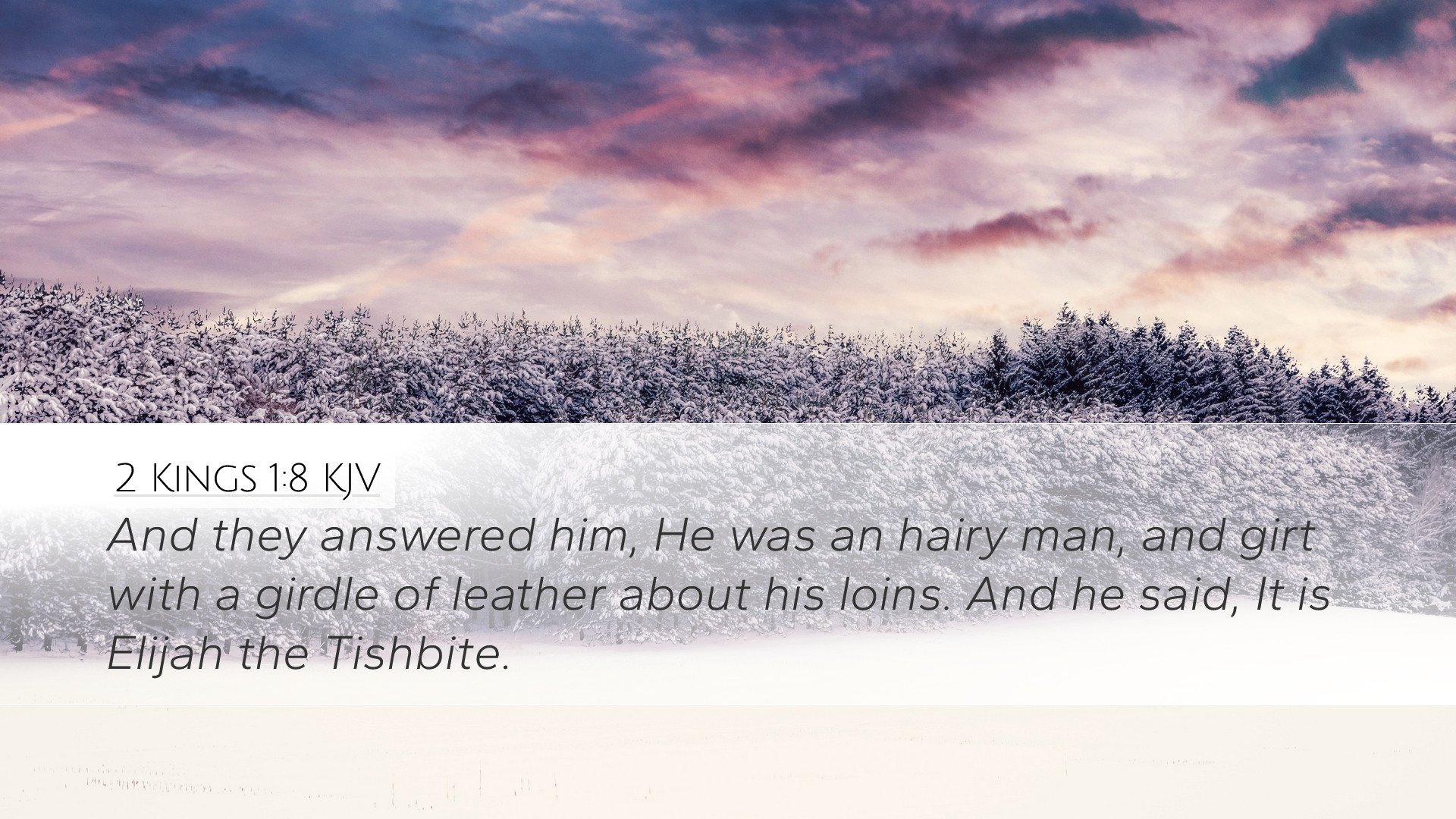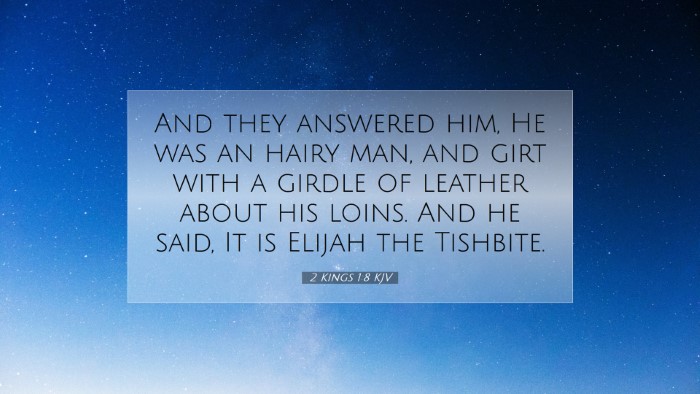Old Testament
Genesis Exodus Leviticus Numbers Deuteronomy Joshua Judges Ruth 1 Samuel 2 Samuel 1 Kings 2 Kings 1 Chronicles 2 Chronicles Ezra Nehemiah Esther Job Psalms Proverbs Ecclesiastes Song of Solomon Isaiah Jeremiah Lamentations Ezekiel Daniel Hosea Joel Amos Obadiah Jonah Micah Nahum Habakkuk Zephaniah Haggai Zechariah Malachi2 Kings 1:8
2 Kings 1:8 KJV
And they answered him, He was an hairy man, and girt with a girdle of leather about his loins. And he said, It is Elijah the Tishbite.
2 Kings 1:8 Bible Commentary
Commentary on 2 Kings 1:8
Verse Context: 2 Kings 1:8 states, "And they answered him, He was a hairy man, and girt with a girdle of leather about his loins. And he said, It is Elijah the Tishbite." This verse introduces the prophet Elijah amidst the context of Ahaziah’s inquiry regarding his injury after falling from a lattice.
Introduction to Elijah's Character
Elijah the Tishbite is a pivotal figure in the prophetic narrative of the Old Testament. His rugged appearance, described as "a hairy man" with a leather girdle, reflects both his ascetic lifestyle and the prophetic tradition. This description is not superficial but carries significant theological implications.
Insights from Matthew Henry
According to Matthew Henry, the prophet's exterior had a meaning that pointed to his inward character and divine mission. Elijah’s hairy mantle and the leather girdle symbolize a life devoted to God, set apart from worldly comforts. Henry emphasizes that true prophets, by their lifestyle and appearance, announce their purpose and identity to God’s people.
Symbolism of Appearance
Henry reflects on how the descriptions of prophets serve illustrative purposes. The "hairy man" alludes to Elijah’s connection to the ways of old Israel, similarly to the Nazarite vow (Numbers 6). This draws a parallel to his role as a reformer of Israel’s spiritual state, battling idolatry and leading the people back to Yahweh.
Insights from Albert Barnes
Albert Barnes also highlights the importance of Elijah's identity being recognized by others. The query about the man’s identity and the response highlights God’s wisdom in appointing prophets who are not merely eloquent but also embody a severe life of dedication and sacrifice.”
Recognition of Prophetic Authority
Barnes points out the importance of Elijah's identity amidst the context of King Ahaziah’s pursuit of false guidance through Baal-zebub. The ungodly king’s misadventure turned back to the true prophet indicates the struggle between the true worship of Yahweh and the deception represented by idolatry. This emphasizes the contrast between light and darkness in the spiritual realm, reflecting the very fabric of the Israelite’s relationship with God.
Insights from Adam Clarke
Adam Clarke provides a comprehensive view on the significance of Elijah's characterization and the cultural context of the time. Clarke explains how the description of Elijah aligns with the period of prophetic activity and highlights the prophetic tradition which valued outward signs reflecting inward convictions.
The Role of Prophets in Israel
Clarke elucidates the critical role that prophets play in society, serving as intermediaries between God and the people. In the tumultuous political landscape of Israel, where Ahaziah seeks counsel from false prophets, Elijah emerges as a steadfast representation of truth who refuses to bow to societal pressures.
Theological Reflections
The characteristics of Elijah as portrayed in 2 Kings 1:8 serve as a reminder of the qualities that God values in His servants: authenticity, courage in confronting sin, and a lifestyle reflective of divine calling. The hairy mantle becomes emblematic of a prophetic mantle that not only proclaims the message but also embodies the truth of that message in personal conduct.
Spiritual Application
- Identification with the Prophetic Call: Followers of Christ and ministers today must evaluate what it means to bear the mantle of service. The lifestyle of sacrifice and commitment, much like Elijah, calls for insights into how personal choices reflect one’s faith and mission.
- Discerning True Prophecy: In a world rife with conflicting messages, distinguishing the voice of God requires diligence and an understanding of scriptural truth - paralleling how the people of Israel needed to discern between Elijah and the prophets of Baal.
- Courage to Confront Idolatry: Ahaziah’s rejection of God's counsel through Elijah pushes modern readers to consider their own allegiances. Are there “idols” in contemporary society that require prophetic confrontation within their communities?
Conclusion
2 Kings 1:8 is rich with implications for understanding prophetic ministry both in the ancient context and in today’s church. The depiction of Elijah as a figure marked by his appearance leads readers to deeper reflections on what it means to be a prophet of God in challenging times. As pastors, theologians, and students of the Word engage with this text, the need for discernment, authenticity, and commitment to God’s truth emerges as a timeless call to action.


